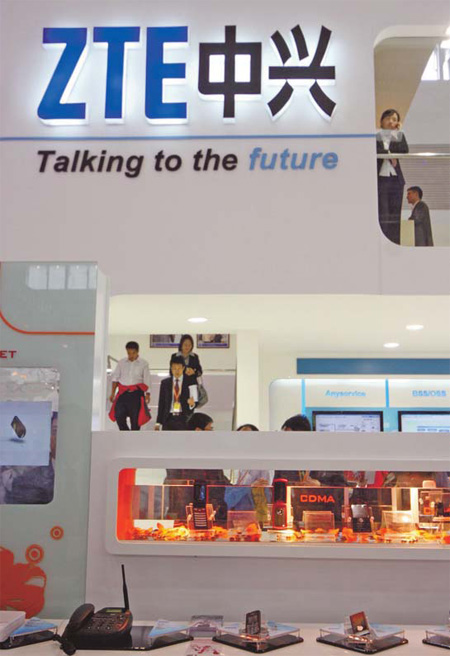Phone maker tries to connect to US
Updated: 2011-12-09 10:21
By Zhang Yuwei (China Daily)
|
|||||||||
|
Visitors stop at ZTE's booth at an international information and communication exhibition held in Beijing. [Wu Changqing / for China Daily] |
Long dominated by US and European companies, the smart phone industry is seeing an influx of Chinese phone makers, who are tapping into the global market.
ZTE USA, a Chinese telecom equipment maker, is aiming to help create cheaper technology for smartphone users in the United States, said Cheng Lixin, the company's CEO in North America.
Shenzhen-based ZTE Corp is China's second-largest telecom equipment supplier after Huawei Technologies. ZTE makes mobile phones, data cards and infrastructure for wireless networks.
ZTE USA follows what Cheng calls an "A-C-W" (America-China-Worldwide) model. He explains that gaining recognition for the company in the US market, coupled with China's low-cost base and production efficiency, will help the business sell worldwide.
In September, the company launched ZTE Score, a fully featured Android smart phone, with Cricket Communications, a subsidiary of Leap Wireless, the seventh-largest telecom network in the US. With a retail price of $129.99, ZTE Score provides the best technology at an "accessible price point", Cheng said.
But the company's growing success has not come easily, as its central business - telecommunications - is a sensitive industry for foreign investors in the US.
Last year, US lawmakers asked the Federal Communications Commission to review the security risks of US companies such as Sprint Nextel, which was negotiating with ZTE and Huawei to purchase their equipment. Sprint ultimately ordered gear from other suppliers. Representatives from Sprint, however, said later that the company's decisions on suppliers were not influenced by any government intervention.
In January, the US-China Economic and Security Review Commission, an independent panel that advises Congress, said that Chinese telecom firms may be conscripted into plans for interfering with US wireless networks. The US government is concerned about Huawei founder Ren Zhengfei's earlier ties with the People's Liberation Army, although he left the army in 1983.
Huawei then challenged the US to launch an investigation into its business. Previously, the US government's foreign investment review had forced Huawei to sell assets it bought from 3Leaf and had interfered with an earlier deal between Huawei and 3Com.
Cheng did not want to comment on Huawei or US policy, but he said Chinese companies need to follow "local rules" if they want to compete in the US market.
Cheng said ZTE's North American operations will step up efforts to increase its share of the US market. He describes its US market share as still "relatively low" even though its sales doubled in the US last year. ZTE is hoping to accelerate growth in the US through ventures with T-Mobile, AT&T and Sprint.
"It's been good. Our growth doubles every year," Cheng said.
ZTE established its presence in the US about 15 years ago. It has 14 offices now, employing about 400 people, more than 180 of whom were hired last year.
"Eighty percent of the hires here are local and this has improved the image of foreign investment in the US," Cheng said.
Cheng is optimistic about investment coming from China to the US, which he said "has great potential (to increase) in the coming years".












